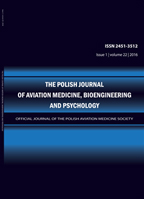2016, Volume 22, Issue 3
Assessment of Knowledge About the Energy Value of Selected Meals by the Helicopter Emergency Medical Service (HEMS) Team
Agata GAŹDZIŃSKA1, Robert GAŁĄZKOWSKI2, Paweł JAGIELSKI3, Mariusz WYLEŻOŁ4
-------------------------------------------------------------------------------------------------
1Laboratory of Dietetics and Obesity Treatment, Department of Pathophysiology and Flight Safety, Military Institute of Aviation Medicine
2Department of Emergency Medical Services, Medical University of Warsaw
3Human Nutrition Department, Faculty of Health Science, Jagiellonian University Medical College
4Department of Surgery, Military Institute of Aviation Medicine
Autor korenspondencyjny: Agata GAŹDZIŃSKA; Laboratory of Dietetics and Obesity Treatment, Department of Pathophysiology and Flight Safety, Military Institute of Aviation Medicine; email: agazdzinska[at]wiml.waw.pl
Full text
Streszczenie
Introduction: An appropriate level of nutrition knowledge resulting in proper eating is one of the components of health behaviours. The profession of both paramedics and pilots should involve taking greater care of one’s health. The aim of this study was to assess the Polish Medical Air Rescue paramedics and pilots’ nutrition knowledge with respect to the energy value of selected meals present in the daily diet.
Material and methods: The assessment of the energy value of selected foods was carried out among all Polish Helicopter Emergency Medical Service (HEMS) pilots and paramedics (66 pilots, 65 paramedics) aged 27-59. Their nutritional status was assessed based on the results of anthropometric tests. The HEMS team’s knowledge about the energy value of selected foods was assessed based on the author’s photographs of meals. The meals energy value was calculated using the applicable Polish tables of foods’ nutritional value and content.
Results: The assessed group was characterizsed by a high share of overweight and obese persons. According to BMI, 34.6% of the tested persons had normal range body mass, 44.9% were overweight, and 20.5% were obese. An analysis of the respondents' answers showed that on average they overestimated energy value of six out of the seven presented meals. The overestimation concerned mainly the energy value of supper (over 215 kcal) and snack I (over 283 kcal). Those were meals including fast food, sweets and stimulants.
Conclusions: The HEMS team’s knowledge about the energy value of meals was unsatisfactory. The level of nutrition knowledge was independent of a person’s profession, education, sex, and BMI. Nutrition education and healthy lifestyle programmes should be implemented in the examined group.
Słowa kluczowe
knowledge about energy value, Polish Medical Air Rescue, overweight, obesity.
